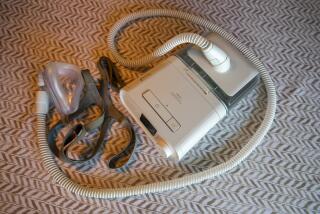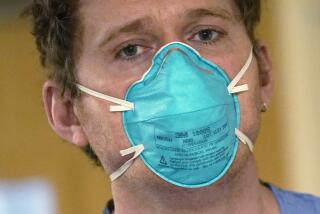Olympus says new steps needed to clean medical scopes of dangerous bugs
- Share via
Olympus Corp., the maker of medical scopes linked to recent deadly superbug outbreaks, reversed course Thursday and said it was issuing an urgent update on how the device should be cleaned.
Under fire from lawmakers, hospitals and doctors, the Japanese company said it had sent revised instructions to medical facilities across the U.S. that included extra steps to ensure that the reusable scope was disinfected.
The company, which is the dominant supplier of the scopes, urged hospitals to begin taking the additional cleaning measures as soon as possible.
Both Olympus and the U.S. Food and Drug Administration have been repeatedly criticized for the recent superbug outbreaks at UCLA Ronald Reagan Medical Center, Cedars-Sinai Medical Center and other hospitals across the country. More than 200 patients at UCLA and Cedars-Sinai have been told they may have been exposed to a lethal superbug from contaminated scopes. Two of the UCLA patients died.
For months, Olympus had repeatedly said that its instructions for cleaning the reusable scope were effective if properly followed by hospitals.
But doctors at many of the hospitals with recent outbreaks have said that they had followed the company’s instructions and patients were still infected with lethal bacteria.
“I do think this is validation of what we have been saying from the beginning,” said Dr. Andrew Ross, chief of gastroenterology at Virginia Mason Medical Center in Seattle, where contaminated Olympus scopes infected 32 patients from 2012 to 2014.
“The old recommended guidelines for reprocessing these instruments were inadequate,” he said.
The FDA said Thursday that it had reviewed the new cleaning instructions as well as data from tests that Olympus performed to prove they work to remove microbes.
In a statement, FDA officials said they believed that the scopes can be consistently and reliably cleaned with “high-level disinfection” when the new instructions are followed.
The revised instructions call for additional flushing to remove debris left in crevices. They also call for a smaller cleaning brush, which the company plans to send to hospitals by May 8.
Lawrence Muscarella, a hospital-safety consultant in Montgomeryville, Pa., said he was skeptical that the new guidelines would ensure disinfection.
“I’d be more comfortable with this new set of instructions and using this brush if there was an independent review of the data,” said Muscarella, an expert on endoscopes. “We can’t take the word of the manufacturer or FDA. If we could, we wouldn’t be here now.”
The flexible scopes are inserted down the throat in a procedure called ERCP, or endoscopic retrograde cholangiopancreatography, which is performed in the U.S. about 500,000 times a year.
Early this month, the FDA said it had tried and failed twice to get Olympus and two other manufacturers to prove their intricate devices known as duodenoscopes could be cleaned of deadly bacteria.
The FDA also revealed that Olympus had never tried to get the necessary government clearance for the redesigned duodenoscope that it introduced in 2010. That model, the TJF-Q180V, was used at several of the hospitals where patients were infected.
The agency said it had decided not to pull the redesigned device from hospitals because of the benefits that the ERCP procedure has for critically ill patients. If recalled, hospitals would not have enough of the devices, the agency said.
Olympus has said it didn’t believe it needed to get regulatory approval of its redesigned scope.
The FDA said Thursday it is continuing to review the data that Olympus has submitted to get the device cleared. An agency spokeswoman added that the FDA is also working with two other manufacturers of duodenoscopes, Pentax Medical and Fujifilm, to prove through test data that their cleaning procedures work.
Hospitals have been frustrated that they didn’t learn until recently that there was no rigorous testing to prove that the scopes could actually be cleaned.
“We have all assumed the safety testing, validation and regulation of these devices has already been done,” Ross said. “We should not have to find out otherwise like in this situation.”
Doctors at UCLA and Cedars-Sinai said after the outbreaks that they have already been taking extra cleaning measures to ensure the scopes are disinfected.
U.S. Rep. Ted Lieu (D-Los Angeles) has called for congressional hearings into the recent outbreaks.
“I’m pleased we are seeing some action from the manufacturer,” Lieu said Thursday. “At least they are acknowledging there is an issue with the current cleaning protocol.”
The FDA spokeswoman said it was the agency’s understanding that Olympus would provide an initial allotment of brushes free of charge.
Twitter: @melodypetersen
Twitter: @chadterhune
More to Read
Inside the business of entertainment
The Wide Shot brings you news, analysis and insights on everything from streaming wars to production — and what it all means for the future.
You may occasionally receive promotional content from the Los Angeles Times.












